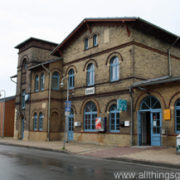Maifeiertag is the name given to the first (1st) day of May, known in English as May Day. It is also known in Germany as the Tag der Arbeit.
It is a public holiday, but unlike in some other countries it always falls on the 1st and is not moved to accommodate weekends.
The day was first celebrated in Germany during the time of the Weimar Republic in 1919, but it was not until 1933 that the bank holiday status was confirmed as being an annual event.
Traditionally Maibäume as erected for this day. Some of these are highly decorated, others resemble maypoles with coloured ribbons.
In the cities, however, the day is more political with demonstrations for workers’ rights.
Most people spend the day with their families.
To hear a simple explanation and a short discussion in German, listen to the podcast:
(Press the “play” button to listen to the podcast)





[…] means that for many, the only time people actually eat meat cooked over a fire is on days such as Maifeiertag, Christi Himmelfahrt and Fronleichnam when many churches, clubs and organisations have their annual […]